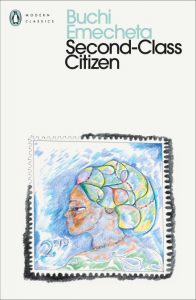 Published by Penguin Modern Classics October 7 2021
Published by Penguin Modern Classics October 7 2021
192pp, paperback, £9.99
Reviewed by Zoë Fairbairns
If a person’s socio-economic status comes from their job, or that of their spouse, Adah and Francis, Nigerian-born Londoners of the 1960s, are about as middle-class as it gets.
Or so you might think. He’s an accountant (at least, he will be, once he passes his exams); she’s a librarian. During her Lagos childhood, she was aware that her femaleness made her second-class, but she had a comfortable home, a supportive father and confidence that upward mobility was possible. Now she has professional qualifications, well-paid employment at the American embassy, and the opportunity to travel to the grand-sounding United Kingdom.
But the reality of life in London proves less than grand. Second-Class Citizen by the late Buchi Emecheta (first published in 1974, and now reissued as a Penguin Modern Classic) chronicles Adah’s steady disillusionment. Housing is overcrowded and overpriced, and local attitudes are often hostile, whether it is the ‘Sorry No Coloureds’ of the British, or the reverse snobbery of her Nigerian housemates who, coming (as she sees it) from the servant classes, mock her for her social pretensions. Husband Francis jeers: ‘In Lagos you may be a million publicity officers for the Americans; you may be earning a million pounds a day; you may have hundreds of servants; you may be living like an elite, but the day you land in England you are a second-class citizen.’
Cold weather and repeated childbearing reinforce this view: not yet 21, Adah has four babies. And the family planning clinic won’t give her contraception without her husband’s written permission. Francis won’t agree, but he won’t leave her alone either: ‘To him a woman was a second-class human, to be slept with at any time and, if she refused, to have sense beaten into her until she gave in.’
Adah’s life has its lighter moments, as she learns how to use hire-purchase, playgroups, the public baths and the NHS.
Sometimes Adah even gets a taste of being ‘a first-class citizen’, a respected professional working in a ‘clean, centrally-heated library.’ She is introduced by a colleague to books by African writers whom she had not previously known about.
Inspired, Adah starts to write a book of her own, Eager for praise, she shows the manuscript to her husband. He burns it.
Adah walks out, taking with her her four babies and a box of rags which a local factory will pay her to sew into garments.
Second-class indeed. But for the author, Second-Class Citizen (and its predecessor In The Ditch, 1972) marked the beginning of a successful series of novels in which she explored – using unflinching honesty and page-turning narratives – the lives of African women living at the intersection of the politics of race, class and gender. The next one would be called The Bride Price, which was the title of fictional Adah’s first literary effort, the one destroyed in manuscript by her fictional husband.
